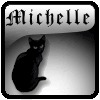Beware...spoilers ahead!
Now I remember why I thought this book was so scary on my first reading. The final third of the book is the scariest part in my opinion. Things come to a head with Florence, as she now seems to be possessed by Daniel, but is it really Daniel... The glimpses of horrific apparitions doing horrific things (the man cutting the woman's head off for instance) really added to the scare factor.
I want to segue a bit to the sexual elements of this story. They are very degrading to women. The house's effects on Edith pray on her guilt of perhaps she might be a lesbian. Which is a product of the time the book was written, I'm sure. Let's face it though. If the things that went on in that house were considered depraved (for the time period of the glory days of Hell House) then I would think it would be highly possible that there were some male on male situations as well. I feel if this book was written in the present day, there would be a more even portrayal of sexuality (depending on the writer I suppose as well), and probably even more depravity. Would the latter be a good thing? I'm not so sure I'd want to read that book.
I watched the film (
The Legend of Hell House) last night and it really doesn't change much from the book, except as I mentioned previously, the women do not look like their descriptions in the book. Also, Barrett does not have a disability, and Edith's name is Ann in the film. The deaths of Florence and Barrett are different as well. And, of course, the sexual elements are toned way down. Not surprising considering it's a 1973 film and anything too strongly sexual back then probably would have received an X rating. I first saw the film when I was very young and I always thought it was scary.
I still consider the ending one of the best of the horror novels I have read. The very ending of the film is the same (which was also one of the things I loved about the film). I did like in the book how the spirit of Belasco actually shows itself to Edith and Fischer before the final reveal. It made for a more menacing, satisfying scene (which does not happen in the film).
I enjoyed my reread of Hell House, but I have to admit I didn't enjoy it as much as I did the first time I read it....which was about 15 years ago. I guess that shows how reading tastes can change over the years. I read so much horror now too so that could also explain my feelings changing.
What did you think of this section, and the book as a whole? Let me know if I failed to touch on anything, and add your personal thoughts in the comments (or if you posted on a blog or elsewhere, share the link and I'll stop by).
Thanks for joining another Something Wicked Fall read-along. I can't believe tomorrow is the last day. I guess we will just have to look forward to next year.
Wishing you a very Happy Halloween!







.jpg)

